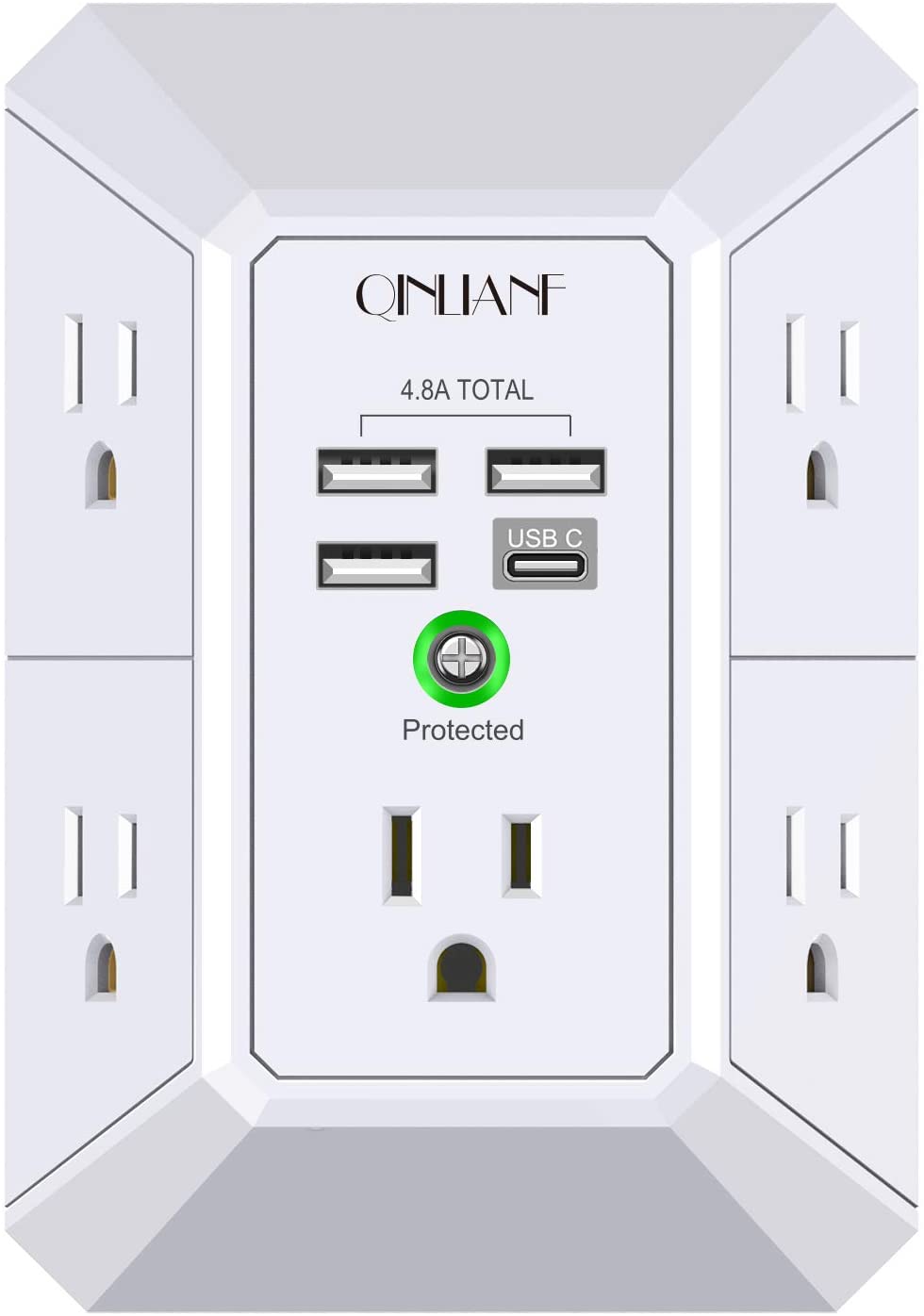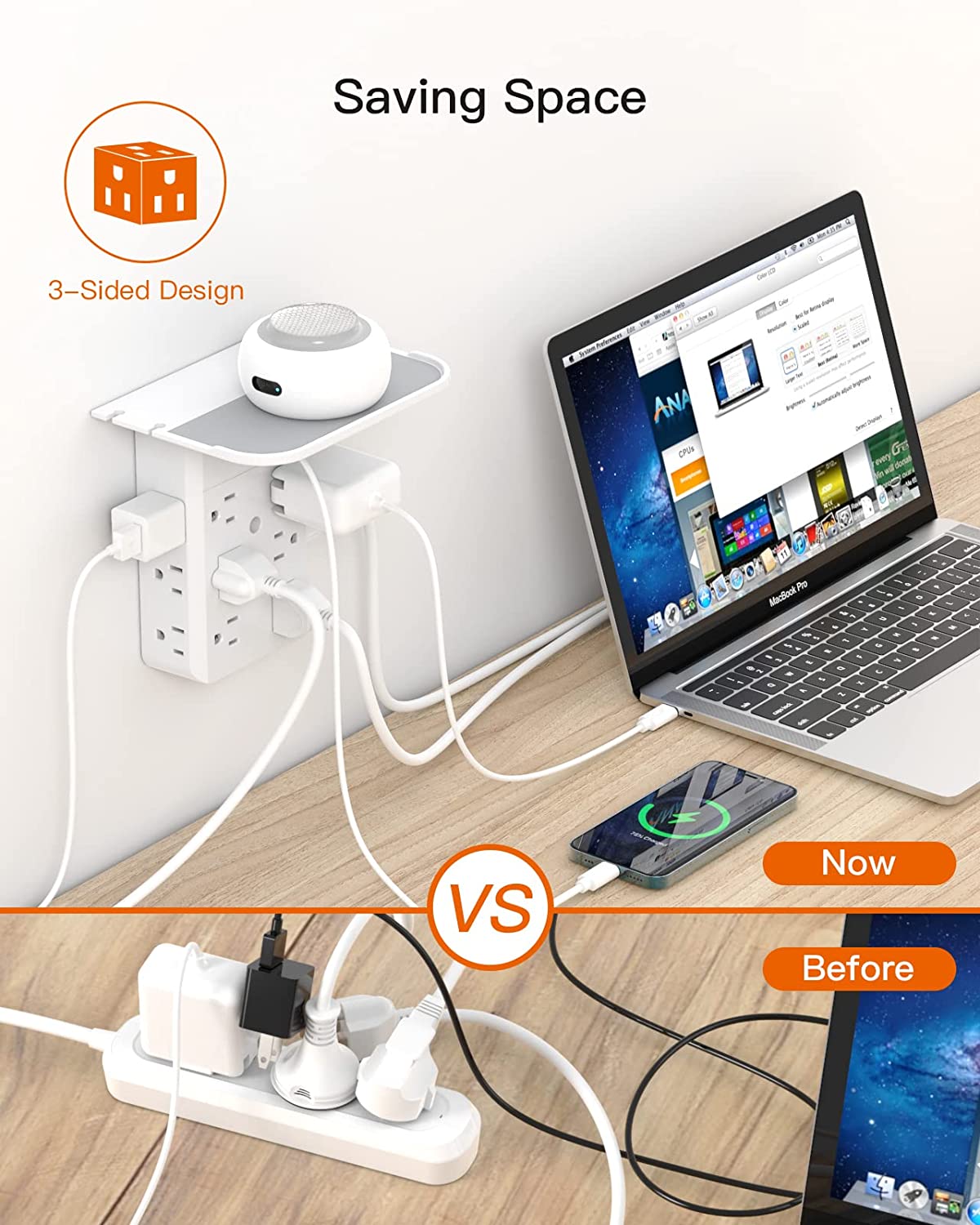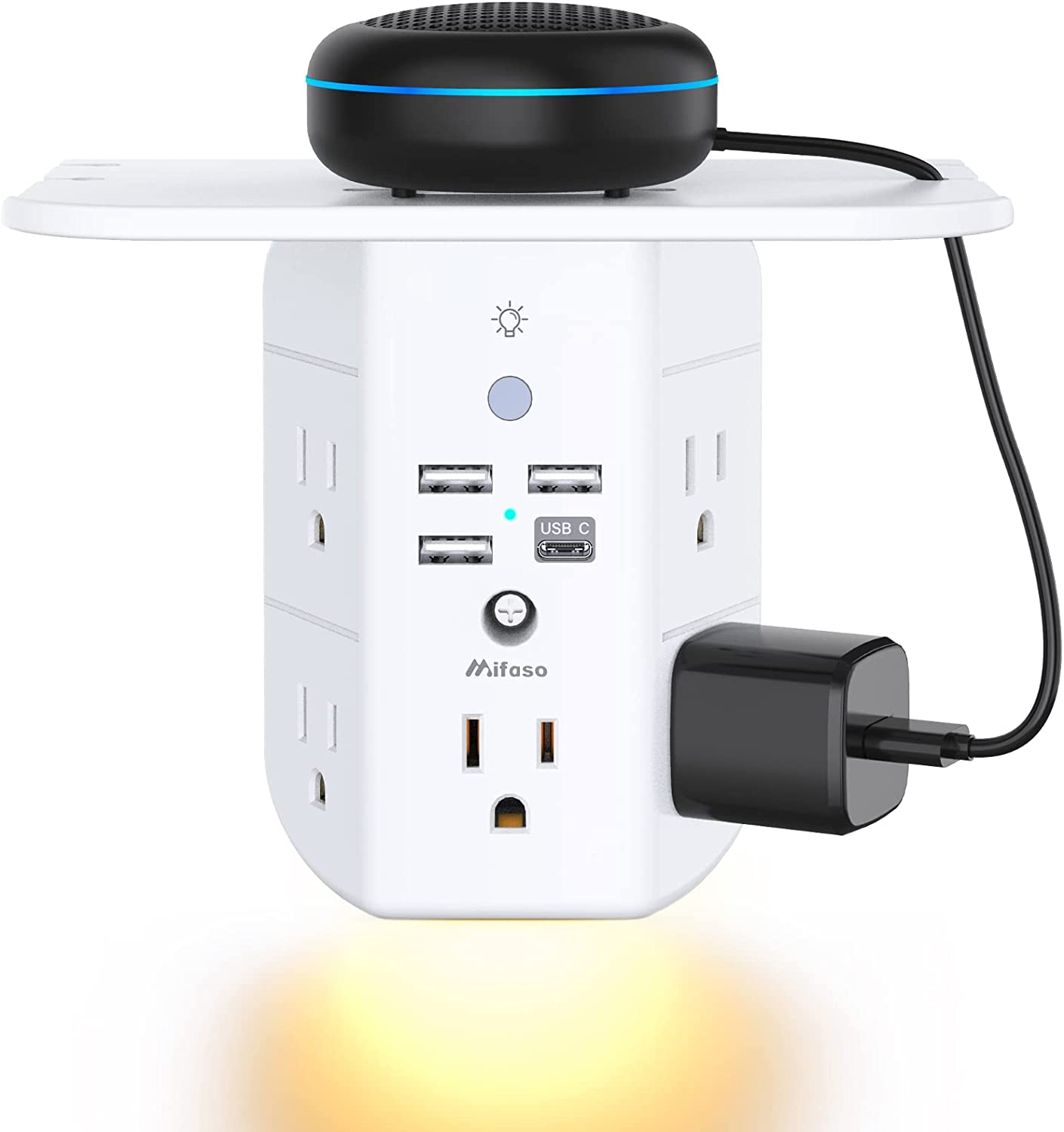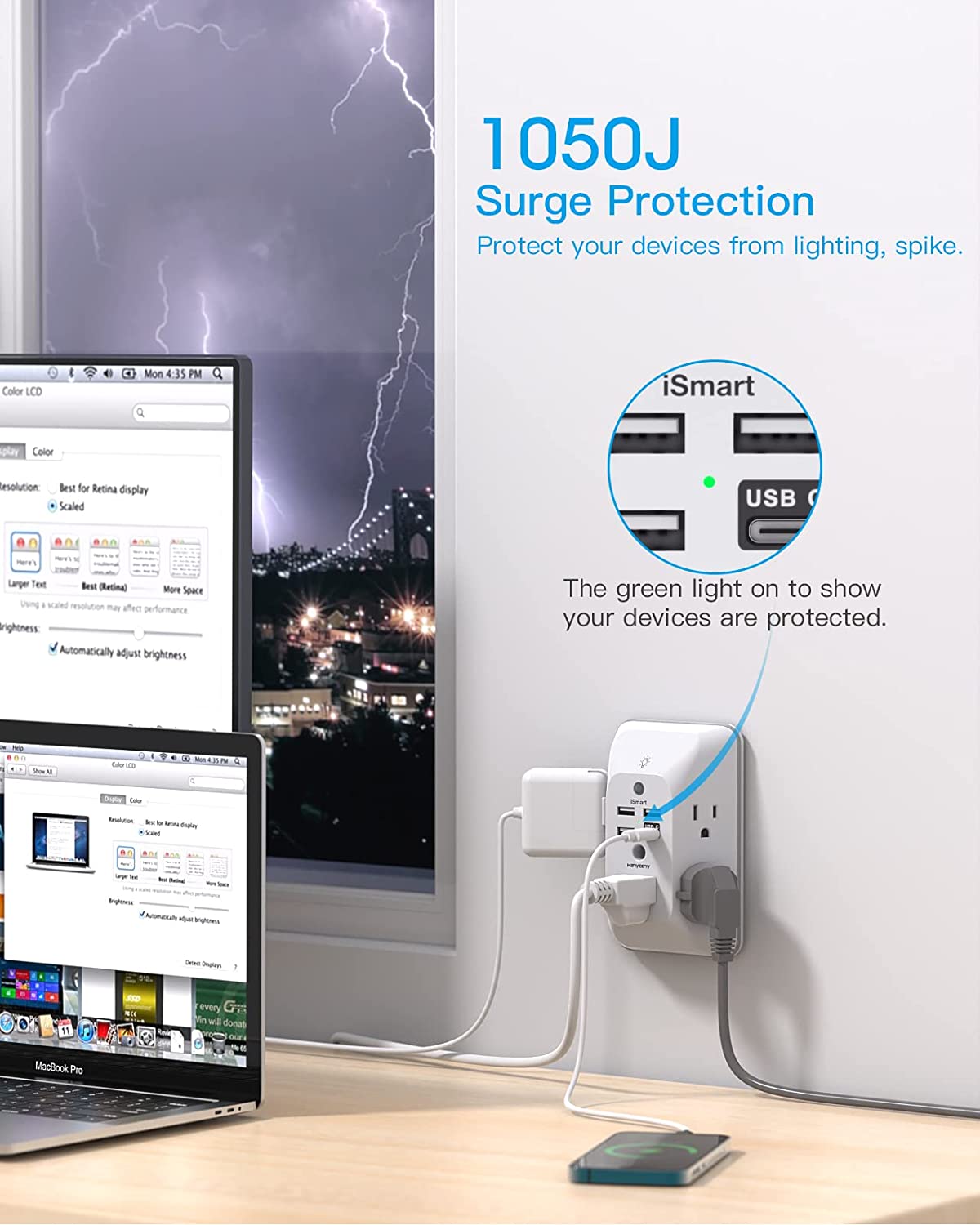If you've ever been sitting in front of a wall outlet only to realize that your plug is too short, you know how frustrating it can be. The good news is that there are products out there designed specifically to extend the reach of your power strips or wall outlets so you never have to worry about reaching again.
There are many different types of extension cords on the market, but they all fall into one of two categories: grounded or ungrounded. Grounded cords should always be used with electronics as they protect against electrical shock and fire caused by contact with “neutral” wire inside the cord. Ungrounded cords are generally more lightweight and portable but should not be used for devices that require protection from electrical shock like computers, coffee makers, and other appliances powered by grounded plugs.
How We Choose
We've done our best to find the absolute best wall outlet extenders on the market, but as with any product, it's possible that there could be a better option out there. With that in mind, we've included links to some alternative options below so that you can browse through them and see if they suit your needs better.
Outlet Extender with 4 USB Charging Ports

The QINLIANF HR-519D is another great option for people who need a surge protector that can handle all the different devices that they want to plug in at once. This model has five AC outlets and four USB ports, providing enough power for your whole household's needs.
The HR-519D also comes with a smart charging technology that detects when you're using an item like a Kindle or an iPhone and automatically adjusts the speed of how quickly it charges. The unit also comes with three different types of surge protection, including metal oxide varistors, gas discharge tubes, and TVS (Transient Voltage Surge Arrestor). All these protections work together to keep your devices safe from harm whenever there's a sudden spike in voltage coming through the wall socket.
This model offers decent protection against power surges but won't be able to protect against other kinds of surges such as lighting strikes or lightning storms.
Wall Outlet Extender with Shelf

The One Beat Wall Outlet is a great option for users who need to have the flexibility of having surge protection, as well as three USB charging ports and three smart-catering USB C ports.
The prongs on this outlet are white plastic, which means that they're not quite as stable as some other options on this list. The product also doesn't come with its own wall plate or screws, which is a bit of a nuisance if you're looking for an all-in-one solution that can be used in multiple rooms.
Wall Outlet Extender with Shelf and Night Light

If you're in the market for a power strip that can do it all, then we think the Surge Protector Outlet Extender is your best bet. It's got five USB ports, three high-power outlets and a smart LED nightlight.
It also comes with a removable shelf that allows you to use the extender as an outlet extension so that you no longer have to unplug everything when charging your phone or tablet. With this kind of versatility, there's really nothing else on our list that offers this level of convenience and usability at such an affordable price point.
Multi Plug Outlet Extender with Night Light

The Hanycony 3-Outlet USB C Wall Charger is another great option if you're looking for an affordable USB C charger that packs in a lot of power. Like the other options on this list, this one comes with three USB ports and a sleek white design. It also has surge protection and overvoltage protection, so it can handle the occasional voltage spike without frying your devices.
The three standard ports are all rated at 2.4A each, which means they're capable of charging your most powerful laptops quickly and safely. The fourth port is dedicated to using the phone's existing AC cable connection as a charging point if you want to use this device as a travel charger too. This can be useful if you need to charge multiple electronics during a trip and don't have access to an electrical socket or power bank at home or work - though we'd recommend packing along more than just one device when doing so!
Wall Outlet Extender FAQs
You want to know which is the best wall outlet extender for your needs, but you don't have time to sift through all of the different options and questions that go along with them.
Don't worry! We've got you covered. Here are some of the most Frequently Asked Questions about wall outlets and the best ways to address them so that you can make an informed decision when it comes time to purchase a new one for yourself or as a gift for someone else.
Are Wall Outlet Extenders Safe?
While safety is a concern with any extension cord, it's especially important when you're dealing with the electricity powering your refrigerator or freezer. That's why experts at places like The Home Depot recommend choosing an extension cord that has an enhanced electrical protection system, like a circuit breaker.
You can also look for wall outlet extenders that are UL rated, meaning they meet the standards set by Underwriters Laboratories. These types of devices also feature a seal to ensure no water leaks into the connection point and create an additional barrier between you and the exposed prongs on the power strip or surge protector.
A good way to know if your wall outlet extender is safe is to check its certification from one of these organizations: ETL North America, Intertek SGS, and UL (formerly called Underwriter's Laboratories).
How Do You Extend A Wall Outlet?
Extending a power outlet is one of the most common projects for beginners. It's also one of the easiest and can be done with minimal tools in just a few minutes.Shut off the power to the outlet: Make sure you turn off the power to each wall socket. In many cases, this means turning off a main breaker at your home's service panel. Be sure to check with an electrician if you aren't certain how to do this properly.Unscrew the cover plate: Using a screwdriver, unscrew and remove the existing outlet cover plate from your wall. If there are no screws holding it in place, you might need to use electrical tape or another type of fastener as a substitute. Run your extension cord: Now it is time for one of our favorite tricks! Push your extension cord through so that about 6 inches (15 cm) sticks out on each side of your new hole. Securely tighten: Next, firmly twist and push down on both sides of your extension cord so that they securely screw into place against their respective sockets. Note that solid-core cords tend to work better than those with separate conductors wrapped together like telephone wires. You may need pliers or another tool if yours are too stiff or small.
Can You Put An Outlet Extender On A GFCI Outlet?
You can, but we don't recommend it. While a GFCI outlet is designed to shut off power if there's a problem with the wiring, an extender essentially creates a new circuit by bypassing the breaker. This means that your devices won't have protection from any power surges or other issues in your home's electrical system. For this reason, it may be best to invest in a long extension cord instead of putting an extender on your GFCI outlet.
Do Outlet Extenders Use More Electricity?
In general, yes. The amount of electricity your power strip uses is referred to as its wattage rating, and most are rated at around 15 amps (or 15,000 watts). Many high-quality power strips can handle a variety of different plug sizes; some as large as 10 gauge.
By plugging your strip into an outlet extender, you're effectively adding length to the cord. This means that the strip will now be plugged into a wall farther away, which may not be convenient in your home but could be helpful if you're setting up an event or trade show booth. If the outlet extender is closer to the ground than your existing outlet, it's likely using more energy because it's doing more work transporting that same energy over a greater distance from point A to point B.
What Should Not Be Plugged Into A GFCI Outlet?
Not only should GFCI outlets not be used for overhead lighting, but you also need to make sure you do not plug in any of the following items:
Anything that is not grounded properly (like a two-pronged lamp)
Electric hot pots or other appliances with exposed heating elements (such as hair dryers, curling irons and coffeemakers)
Non-weatherproof outdoor outlets or hose bibs (as they may allow water intrusion)
Do Appliances Use Electricity When Plugged In But Turned Off?
Most appliances use power whether or not they're turned on, but the amount of electricity used depends on the appliance. For example, a computer might use as much as 15 watts when turned off and up to 100 watts when in standby mode. Anything that requires batteries will also use some electricity even if it's not being used.
Many newer appliances have smart technology that reduces standby power usage by turning themselves off or into a low-power state after periods of nonuse. Some dishwashers and clothes dryers do this when not in use for several hours. You can test how efficient your appliances are by using a watt meter or an appliance monitor, which you plug into an outlet to track energy usage over time.
Should A Fridge Be Plugged Into A GFCI?
While a refrigerator draws more electricity than most other appliances, it is still considered to be a low-voltage device. As such, it should not be plugged into a GFCI (ground fault circuit interrupter) outlet unless you have an approved surge protector specifically designed for use with refrigerators.
A GFCI will protect against electrical shock if the refrigerator's cord comes loose from the wall socket and there is movement of the appliance or its contents in relation to the outlet. If your refrigerator is on wheels, that alone can cause it to trip a GFCI if it continues to move while no one is home to shut off power at the breaker box.
Conclusion
Selecting the best wall outlet extender can be a challenging task. It is important to consider several factors such as compatibility, design, durability and price. Before making a purchase, take the time to read reviews from other customers so that you can make an informed decision about which product is right for you. With proper research and consideration of key features, one can find the perfect wall outlet extender that will meet their needs without breaking the bank.









